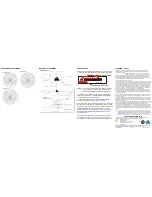
GPS-534 and GPS-534-C
The GPS-534 is an active
antenna designed to operate at
the GPS L1 and L2 frequencies,
1575.42 and 1227.60 MHz and
across the L-Band from 1525 to
1560 MHz. The GPS-534-C
version is aircraft certified for
navigation. This guide provides
the basic information you need to install and begin using your
new antenna.
ADDITIONAL EQUIPMENT REQUIRED
• A device with an antenna input port that both receives the RF
signal and provides 2.5 to 24.0 VDC to the antenna is required
to set up the GPS-534. (NovAtel GPS receivers provide the
necessary power through their antenna RF connectors.)
• Coaxial cable with a male TNC connector
INSTALLING THE ANTENNA
Both the input DC power and the output RF signal flow over a
single coaxial cable that is connected to the unit's TNC female
connector.
The antenna can be attached to a surface by means of an
ARINC-743 Bolt Pattern.
Four screws pass through the housing of the antenna.
Install the antenna as follows:
1.
The antenna is supplied with an o-ring. Place it in the o-ring
groove of the antenna base.
User-supplied o-ring grease can be used to hold the o-ring in
the groove during installation.
2.
Pre-drill the mounting holes and the connector hole on the
surface, see the Mechanical Drawings section of this guide
for details on the ARINC-743 mounting pattern.
3.
Attach the antenna to the surface using the four mounting
screws supplied. The o-ring compresses and creates a seal
between the surface and the antenna.
Ref. #
Description
Ref.#
Description
1
534 antenna
4
O-ring
2
Countersink screws
5
Pre-drilled mounting holes
3
Mounting surface
4.
Remove the dust cap from the antenna’s TNC connector.
5.
Attach the male TNC connector of the coaxial cable to the
antenna’s TNC connector.
Ref. #
Description
1
Antenna
screwed into
place
2
Surface
3
TNC connector
4
Coaxial cable
6.
Attach the other end of the coaxial cable to the antenna input
port of the receiving device, which must provide power as
detailed in the
SPECIFICATIONS
section of this guide. All
NovAtel GPS receivers provide the necessary power
through their antenna RF connectors.
The graphic above shows examples of where the 534 antenna
may be placed on an aircraft or vehicle (not to scale).
ANTENNA CARE
The GPS-534 is designed to withstand the elements, including
rain, snow, and dust. However, to ensure your antenna performs
optimally, keep the radome clean and brush off any ice and
snow. In addition, ensure the TNC connector remains clean and
dry and replace the dust cap when a cable is not connected.
SPECIFICATIONS
USER GUIDE
1
2
3 4 5
1
3
2
4
RF
3 dB pass band (typical)
L1:
1575.42 ±13 MHz
L2:
1227.60 ±13 MHz
LB:
1542.50 ±17.5 MHz
Out-of-band rejection (typical)
>
40 dBc
Gain at zenith (
θ
= 90°) (min)
L1: +4.1 dBic, L2:+3.9 dBic,
LB: +5.7 dBic
Gain roll-off (zenith to horizon)
L1/LB: +8 dB, L2:+8 dB
LNA gain
40 dB ±3
Polarization
Right-hand circular
Noise figure (typical)
1.9 dB
Nominal impedance
50
Ω
VSWR
<
1.5 : 1
POWER
Input voltage
2.5 - 24.0 VDC
Current
<
35 mA
PHYSICAL
Size
Width 76.20 mm (3.000”)
Length 119.38 mm (4.700”)
Height 20.00 mm (0.788”)
Weight
191 g (6.8 oz.)
ENVIRONMENTAL
Maximum altitude
21336 m (70000 ft.)
Operating temperature
-55°C to +85°C (-67°F to +185°F)
Storage temperature
-55°C to +85°C (-67°F to +185°F)
Designed to meet these
standards
a
a. If you purchased the GPS-534-C version, your antenna has
the full FAA TSO-C144 certification.
RTCA DO-160D, RTCA DO-228,
MIL-C-5541, MIL-E-5400,
MIL-I-45208A, MIL-STD-810
and SAE J1455



















